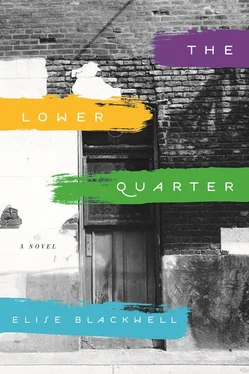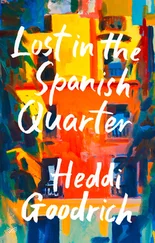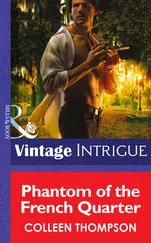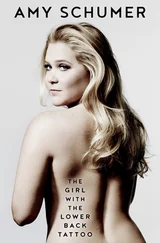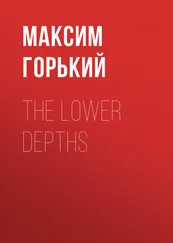“And right now we have two more days before I go,” he said, moving into her, his lips finding hers.
As he waved from the back of a taxi crawling up Decatur Street toward the interstate, toward Louis Armstrong Airport, she felt happy.
It was easy to sink back into the life she had made, working while listening to music, eating her lunch across the street, working some more, making her supper, and reading herself to sleep, most often with some history about the settlement of New Orleans or a novel written by a writer who’d lived in the city, usually in the Vieux Carré.
One day in the run-up to the city’s first Mardi Gras after the storm, she walked to the bookstore.
“Got a new history title you might like,” the bookseller told her. “Nice illustrations, too.”
She shook her head. “Actually, I was thinking of trying something new, maybe something about how the city is now, or maybe I will browse through your art section.” She looked down at her fingers, which were resting on a stack of paperback novels.
“Science fiction, local author,” the man said. “Kind of a dystopian future of Louisiana after it’s mostly underwater.”
“I guess some future is better than no future, right?” she said, and the bookseller laughed as she turned her head to read the spines of the books lining the wall.
Later that day a package arrived with European stamps, and she felt afraid until she realized the stamps were British, from a place where she knew no one at all. She opened her other mail first and then turned to it, using a box cutter to pierce the heavy tape.
The package contained a small bound journal: pale in color, finely grained, softer than any leather she had touched before. She opened it, and tucked inside its thick ivory pages — all of them blank — was the obituary of a wealthy Belgian industrialist whose murder was still under investigation. Fatter and older than she remembered, now clean-shaven. But even the poor quality of the newspaper’s reproduction of his official photograph did not disguise his small, cruel eyes. Stuck to the obituary was a yellow Post-it note that read, “He knew it was from you. He knew it was for you.”
Johanna sat with the photo a while before tucking it back into the journal, which she placed in the file drawer that held her documents of identity and survival.
After a slow cup of coffee, she retrieved her toolbox from downstairs and located a new nail and the smaller of her two hammers. She removed from the closet her favorite object in the world and freed it from the layers of butcher paper protecting it.
She considered each of the walls in her flat before hanging the painting across from the sofa, where she could look at it whenever she wanted.
I am beholden to the great city of New Orleans and apologize for taking small liberties with its geography and post-Katrina chronology. Thanks to New Orleans photographer and writer Louis Maistros for permission to use the cover image. (More of Louie’s work can be viewed at www.louismaistros.com.)
This novel was written with the partial support of a University of South Carolina Provost’s Grant for Creative and Performing Arts, for which I am grateful. I also want to thank the College of Arts & Sciences and everyone who participates in The Open Book.
I am indebted to family (including various Blackwells and Bajos) as well as friends and colleagues (including those who are both friends and colleagues).
I would not have books in the world without help along the way from many writers. Some of them know who they are; others have helped me through their work alone.
Thanks to my editor, Fred Ramey, for being a better reader and person than a writer could invent; to my agent, Terra Chalberg, for her editorial insights and professionalism; and to everyone at Unbridled Books for their unwavering commitment to books.
My life would be much less rich without the amazing Esme Bajo, and I’m lucky to even know her. I am grateful to David Bajo for more than a quarter century of good literary company — and for helping me restore the thing most worth saving.
